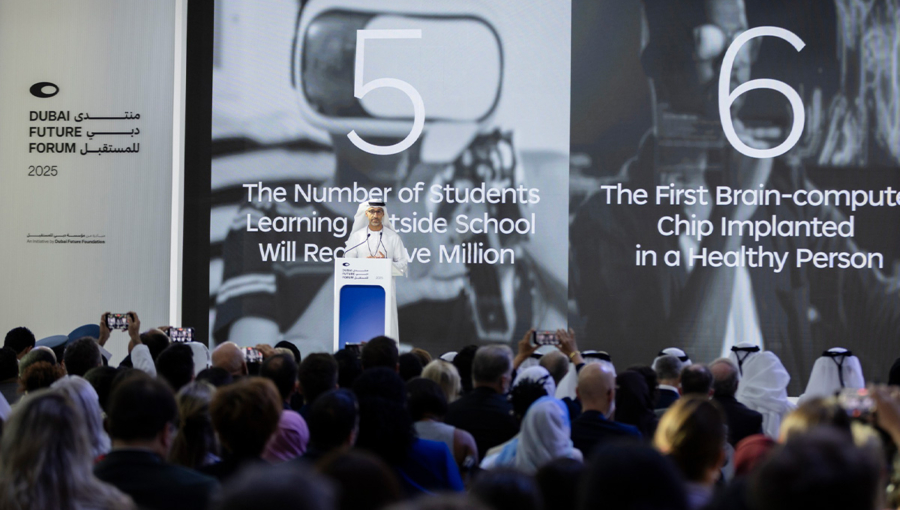The ability of nations to thrive in the AI age will depend less on traditional measures of economic output and more on the collective cognitive strength of their societies, Dubai Future Foundation CEO His Excellency Khalfan Belhoul said today in his opening address at the 2025 Dubai Future Forum, held annually at the Museum of the Future.
Introducing a new concept he described as “National Cognitive Potential,” Belhoul argued that the future will be shaped by countries capable of sustaining deep attention, interpreting complexity, and strengthening the social bonds that enable people to think and act together to create future breakthroughs.
This year’s edition focused on emerging ‘quiet shifts’ that are subtly reshaping societies, from “focus being the new currency” to the redefinition of expertise and belonging. Belhoul argued that recognising these shifts early is essential for countries seeking long-term resilience and strategic clarity.
Speaking to an audience of more than 2,500 futurists, policymakers, scientists, and thinkers from over 100 countries, Belhoul said that while technology continues to advance rapidly, the real differentiator between nations will be “the focused, interconnected minds of their people.”
He described National Cognitive Potential as a next-generation competitiveness indicator; one that reflects “the depth of a nation’s networks, the quality of its relationships, and its collective ability to think, adapt, and act at speed.”
Belhoul also discussed the concept of superforecasting, “the discipline of recognising subtle shifts early, long before the world accepts them as reality.”
‘It’s our opportunity to lose’
In “Governance for the Long Term: How Can We Ensure Intergenerational Fairness?” session,Her Excellency Lucie Berger, EU Ambassador to the UAE, revealed that the EU will announce its first Intergenerational Fairness Strategy in 2026. “Different countries will have to focus on the key challenges they face today, and those their future generations will inherit,” she said.
In the plenary “Building a Regenerative Society: How Do We Redesign Our Foundations?”, Dr Alaa Murabit, Managing Partner of Sustainable Growth, 500 Global, reflected on decades of global progress. “We have cut child death in half in 25 years — polio is 99% eradicated. There have been greater gains for women and children than at any point in history. I am incredibly optimistic… it’s our opportunity to lose.”
In “Polar Futures: What Inspires the UAE’s Journey from Desert to Ice?”, His Excellency Dr Abdulla Almandous, President of the World Meteorological Organization (WMO) and Director General at the National Center of Meteorology (NCM), outlined the Emirates Polar Programme. “We are planning a full research base accommodating more than 50 people, and we are considering our own ship to transport teams from the UAE to Antarctica,” he said.
In “A Future With Nature: Why Wonder Is Our Superpower?”, National Geographic Explorer and WonderLab Founder Anand Varma argued that reconnecting with the natural world may be one of humanity’s greatest strengths.
In “Blueprints for Resilience: What Is Industry’s Role in Driving Economic Futures?”, Abdulnasser Bin Kalban, CEO of Emirates Global Aluminium, discussed how futures thinking enables strategic agility and long-term growth.
Dr Trevor Martin, Co-founder and CEO of Mammoth Biosciences, in “Beyond DNA: What if Your Genetics Are Not Your Destiny?”, explored how emerging technologies could define a future where health is designed rather than predetermined.
In “Mapping Inner Worlds: Can We Decode Human Consciousness?”, Dr Giulio Tononi of the Wisconsin Institute for Sleep Consciousness, neuroscientist and author Dr Anil Seth, and Dawn Nakagawa, President of the Berggruen Institute, challenged prevailing assumptions about the nature of consciousness.
Day 1 concluded with “Prototypes for Humanity: How Do We Foster Innovation for Impact?”, a plenary examining how discovery can be transformed into shared prosperity for generations to come.
The Dubai Future Forum, the world’s largest gathering of futurists, is taking place on 18-19 November 2025 at the Museum of the Future. The Forum brings together more than 2,500 participants from around 100 countries and 200 speakers, including government officials, CEOs, academics, decision-makers, thought leaders and future experts from the UAE and around the world.
